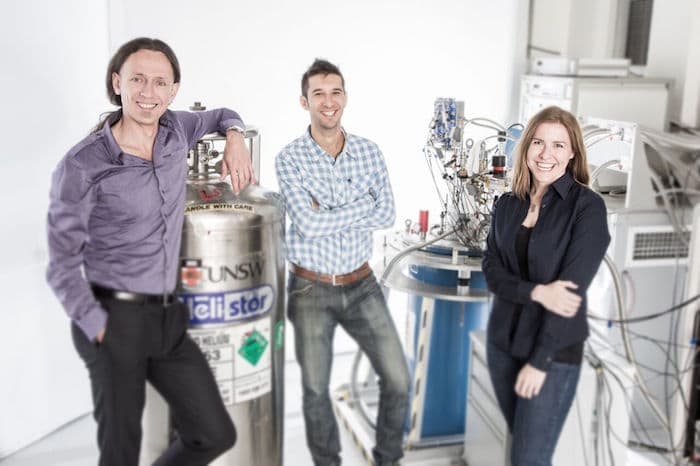UNSW Australia Engineers Succeed In Writing Quantum Computer Code In Silicon
A team of engineers from University of South Wales, Australia has become successful in writing and manipulating a quantum computer code on a silicon microchip using two quantum bits with the highest score ever recorded in an experiment. Their research work hints at the possibility of developing powerful quantum computers of the future based on silicon. The UNSW team made use of a scientific phenomenon called "quantum entanglement" and the theorem called 'Bell's Inequality" to achieve the desired results.
Quantum entanglement is a counterintuitive phenomenon that deals with measurement of one particle affecting another one instantly, no matter how much the distance between them (even two farthest locations in the universe). On the other hand, Bell's Inequality theorem involves a process of verification for whether or not two particles are entangled known as the 'Bell Test'.

Andrea Morello, Juan Pablo Dehollain and Stephanie Simmons at the UNSW Lab
The UNSW research team use two quantum particles aka a single phosphorus atom's nucleus and an electron and placed them on top of each other in a silicon chip. They were successful in passing the Bell test with a particularly high score in such a way that they could access the quantum code using delicate quantum entanglement between two particles.
The team has put together an informative video to share their experiment's results. Take a look -
Different from a normal computer where only four combinations of the two bits aka 00, 01, 10 and 11 are possible, a quantum computer can make superpositions such as (01 + 10) or (00 + 11).
With the availability of such a variety of code words, quantum computers have the power to process different algorithms that reach the desired results in a much smaller number of steps than classical computers.
The UNSW researchers are excited about the possibilities that their efforts have unlocked. They've now proven beyond doubt that writing quantum computing code inside a device that's made of silicon microchips (aka your smartphone or tablet) is 100% possible and this is a BIG win for electrical engineering.
What are your thoughts about the new research work presented by the Australian engineers? Share with us in comments below.
Source: <a href="https://newsroom.unsw.edu.au/news/science-tech/quantum-computer-coding-silicon-now-possible" target="_blank" rel="noopener noreferrer">Quantum computer coding in silicon now possible | UNSW Newsroom</a>
Quantum entanglement is a counterintuitive phenomenon that deals with measurement of one particle affecting another one instantly, no matter how much the distance between them (even two farthest locations in the universe). On the other hand, Bell's Inequality theorem involves a process of verification for whether or not two particles are entangled known as the 'Bell Test'.
Andrea Morello, Juan Pablo Dehollain and Stephanie Simmons at the UNSW Lab
The UNSW research team use two quantum particles aka a single phosphorus atom's nucleus and an electron and placed them on top of each other in a silicon chip. They were successful in passing the Bell test with a particularly high score in such a way that they could access the quantum code using delicate quantum entanglement between two particles.
The team has put together an informative video to share their experiment's results. Take a look -
Different from a normal computer where only four combinations of the two bits aka 00, 01, 10 and 11 are possible, a quantum computer can make superpositions such as (01 + 10) or (00 + 11).
With the availability of such a variety of code words, quantum computers have the power to process different algorithms that reach the desired results in a much smaller number of steps than classical computers.
The UNSW researchers are excited about the possibilities that their efforts have unlocked. They've now proven beyond doubt that writing quantum computing code inside a device that's made of silicon microchips (aka your smartphone or tablet) is 100% possible and this is a BIG win for electrical engineering.
What are your thoughts about the new research work presented by the Australian engineers? Share with us in comments below.
Source: <a href="https://newsroom.unsw.edu.au/news/science-tech/quantum-computer-coding-silicon-now-possible" target="_blank" rel="noopener noreferrer">Quantum computer coding in silicon now possible | UNSW Newsroom</a>
0

